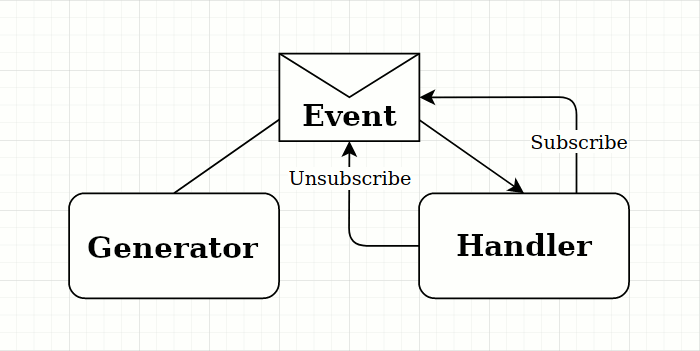
Global events in C#
Attention! This is the result of my experiments with C# delegates, if you plan to use it in your projects - do it carefully.
Prolog
As mentioned above, when creating an application in Unity3d, I came across the fact that it is necessary to transfer data from one object to another.
Moreover, this was complicated by the use of multitsen. My project involves creating a lot of scenes and I really did not want to manually implement dependencies.
Methods like FindObjectsOfType were also not suitable for me, as they take up too many resources to search for objects. I wanted to simplify data transfer between scene objects as much as possible without compromising performance.
As I delved deeper into the various architectural patterns, I came across ECS and decided that I had found a silver bullet that would kill all my monsters. After trying out the most popular frameworks in this area, I chose Actors. Its authors are very friendly guys, they even allowed me to make some changes regarding the loading of scenes from AssetBundle.
But as is often the case with frameworks, it provided me with huge opportunities, most of which I did not intend to use inside my project. Basically I used a structure called Signals. The author himself described it something like this: “it sends a message literally into the void, and if there is a recipient for it, it will receive it in any part of the application”. This more than covered the entire range of my tasks to ensure interaction between objects in scenes. Having realized what I really needed, I began to experiment with the entities known to me at that time in C#.
Design
The block diagram shows the simplest way to transmit a event from a sender to a receiver:

The handler subscribes to a certain type of event. Generator creates an event, passes data to it, and sends it to all subscribed handlers. The handler receives this event, extracts data from it, and processes it. The handler can break the connection by unsubscribing from the event. Thus, the generator and the handler may not know anything about each other, and the event serves as an interface for passing data between them.
Implementation
I created a generic base class for all events that accepts derived classes as a type:
public abstract class GlobalEvent<T> where T : GlobalEvent<T>
{
public delegate void Hendler(T globalEvent);
private static Hendler hendlers;
private static HashSet<int> hashs = new HashSet<int>();
private static bool Contains(Hendler hendler)
{
return hashs.Contains(hendler.GetHashCode());
}
public static void Subscribe(Hendler hendler)
{
for (int i = 0; i < hendler.GetInvocationList().Length; i++)
{
AddHendler((Hendler)(hendler.GetInvocationList()[i]));
}
}
public static void Unsubscribe(Hendler hendler)
{
for (int i = 0; i < hendler.GetInvocationList().Length; i++)
{
RemoveHendler((Hendler)(hendler.GetInvocationList()[i]));
}
}
protected static void Handle(T globalEvent)
{
try
{
hendlers.Invoke(globalEvent);
}
catch (System.NullReferenceException e)
{
throw new Exception(e.Message);
}
}
private static void AddHendler(Hendler hendler)
{
var hash = hendler.GetHashCode();
if (!hashs.Contains(hash))
{
hendlers += hendler;
hashs.Add(hash);
}
else throw new Exception($"The {hendler.Method} has already been added in {typeof(T)} hendlers");
}
private static void RemoveHendler(Hendler hendler)
{
var hash = hendler.GetHashCode();
if (hashs.Contains(hash))
{
hendlers -= hendler;
hashs.Remove(hash);
}
else throw new Exception($"The {hendler.Method} has not been added in {typeof(T)} hendlers");
}
public class Exception : System.Exception
{
public Exception(string message) : base(message)
{ }
}
}
This class encapsulates the delegate in a field with the static modifier. The delegate contains methods that take as a parameter an object derived from the GlobalEvent<T> type. With the help of this delegate, the mechanism for subscribing to a event is implemented.
Attention! With great power comes great responsibility: since method references are stored in a static variable, make sure that the objects are unsubscribed from the event in a timely manner, otherwise the garbage collector will not be able to delete them and there will be a memory leak.
Despite the fact that the field is declared in the base class, each derived class has its own delegate. Due to this, only events of the type to which the handler has subscribed are processed. The Subscribe(Hendler hendlers) method is used to add subscriber delegates, and Unsubscribe(Hendler hendlers) - to delete them.
Simple event example
To implement an event, it is enough to inherit from the GlobalEvent<T> type, passing the type of the derived class into it, and add a method to fire this event:
public class Message : GlobalEvent<Message>
{
public string Text { get; }
private Message(string text) => Text = text;
public static void Send(string text) => Handle(new Message(text));
}
In this implementation, the Message event encapsulates a string of text that it will receive when it is created and then send to the recipients.
To send a message, use the static Send(string text) method. All that is required of him is to create an instance of the Message class and call the Handle(Message message) method, passing this object as a parameter.
Sending and handling an event
In order to handle the above event, you need to implement a method that takes this event as a parameter:
private void Receive(Message message)
{
System.Console.WriteLine(message.Text);
}
Let’s subscribe this method to the event:
Message.Subscribe(Receive);
After that, to send the above message, a simple line is enough:
Message.Send("Hello World!");
Don’t forget to unsubscribe as soon as the receipt of this event is no longer relevant for us:
Message.Unsubscribe(Receive);
Conclusion
The main advantage of this approach is that I can create an event in one part of the program and process it in another, without direct interaction between the handler and the event emitter.
But there are also many disadvantages:
- The use of static variables with all the “leaking” consequences
- Global, public access to all events does not contribute to security
- The need to control the lifetime of handlers
Therefore, it is important that the handler subscribes to the event before its creation and is unsubscribed as soon as it is no longer needed or it becomes disable, and the data passed to the event when it is created is immutable.
You can also use global events in your project by adding this repository as a submodule:
git submodule add https://github.com/ididdidi/CSharp-GlobalEvent
Thanks for your attention :)